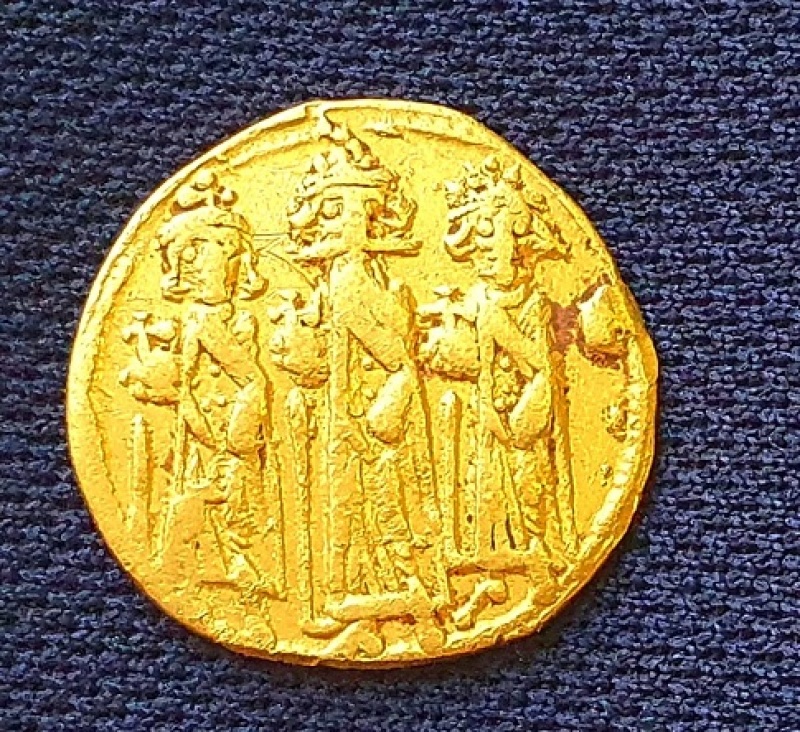
A gold coin dating to the Byzantine era reportedly depicting the crucifixion of Jesus Christ was unearthed near Tel-Aviv in Israel.
The Christian Headlines said archeologists discovered the coin and other interesting artifacts on Christianity while working in an excavation site in Israel's city of Ramat Ha-Sharon.
The excavation, said to be spearheaded by the Israel Antiquities Authority, is part of the Ramat Hasharon Municipality's initiative to have a new residential neighborhood near the planned "holiday park" for its 100th anniversary.
Accordingly, the gold coin was believed to be "a rare and surprising find" being minted in 638 or 639AD by Hercules, the Byzantine emperor at that time and whose face is shown on one side of the coin. The other side of the coin shows Golgotha. The coin also has an inscription in Greek and possibly Arabic. Israel Antiquities Authority Currency Division Head Dr. Robert Cole said the inscription refers to the "name of the person who held the coin" and marked it so because it was regarded as a "valuable asset."
"One of the rare and surprising finds discovered in the excavation is a gold coin, minted in 638 or 639 by the Byzantine emperor Hercules. On one side appears the emperor with his two sons, and on the other--a cross on the hill of Golgotha, on which, according to Christian tradition, the crucifixion of Jesus took place," the Israel Antiquities Authority announced in Facebook on Tuesday.
The coin was unearthed along with the bronze chain of a chandelier that was often used in churches during the said era. The chain is said to be a rare find like the coin for it once was a part of a chandelier that used glass lamp holders.
In addition, there were also four large jars that the archeologists found "sunk into the floor of the room" believed to be a warehouse since the said containers were used " to store seeds and other products" as a means "to protect them from pests and climatic conditions." While a glass-making workshop and a winepress were also found in the excavation area that archeologists say was an industrial field.
Israel Antiquities Authority's Excavation Director Dr. Yoav Arbel, as per CBN News, disclosed that the date of the said artifacts was 1,500 years ago, revealing that the district had "longer history than one might think." Arbel also highlighted that the gold coin showed evidence of Christianity's influence at that time in the region.
"We discovered evidence of agricultural-industrial activity that took place here in the Byzantine period--about 1,500 years ago. It served as a warehouse, and perhaps even as a mansion. Inside the buildings and facilities we found fragments of storage jars and numerous cooking pots, which appear to have been used by those who worked here in the field," the Israel Antiquities Authority quoted Yorbel in saying through a post in Facebook.
"We also found stone craters and millstones, which were used to grind wheat and barley kernels, and probably also to grind herbs and medicinal plants. Some of the stone vessels are made of basalt, which comes from the Golan Heights and the Eastern Galilee," he added.
Arbel also revealed that the artifacts convey that the people did not only come to the area to work but actually live there as evidenced by the ovens they found. The excavation site also had traces of the seventh century conquest made by the Muslims in the area.
"In this period, people were not only working at the site but also living there, because we discovered the remains of houses and two large baking ovens," Arbel stressed.
According to a study in Open Edition, the Crusades had an impact in the manner of food processing, serving, and consumption in Jerusalem as shown by the forms and sizes of the ovens seen from the archaeological findings in the area. The said ovens were often positioned in dwelling places from which one can derive that cooking and baking represent specific cultural settings, as well as, the function of family structure.
The Israel Antiquities Authority has been conducting a series of excavations across different areas in Jerusalem since 2016. Part of its collection are the famed Dead Sea Scrolls discovered in the Judean Desert and considered as the most important archeological find of the 20th Century since it contains the Old Testament text. The authority said their recent findings will be made accessible to people through its "partnership with the community."


























